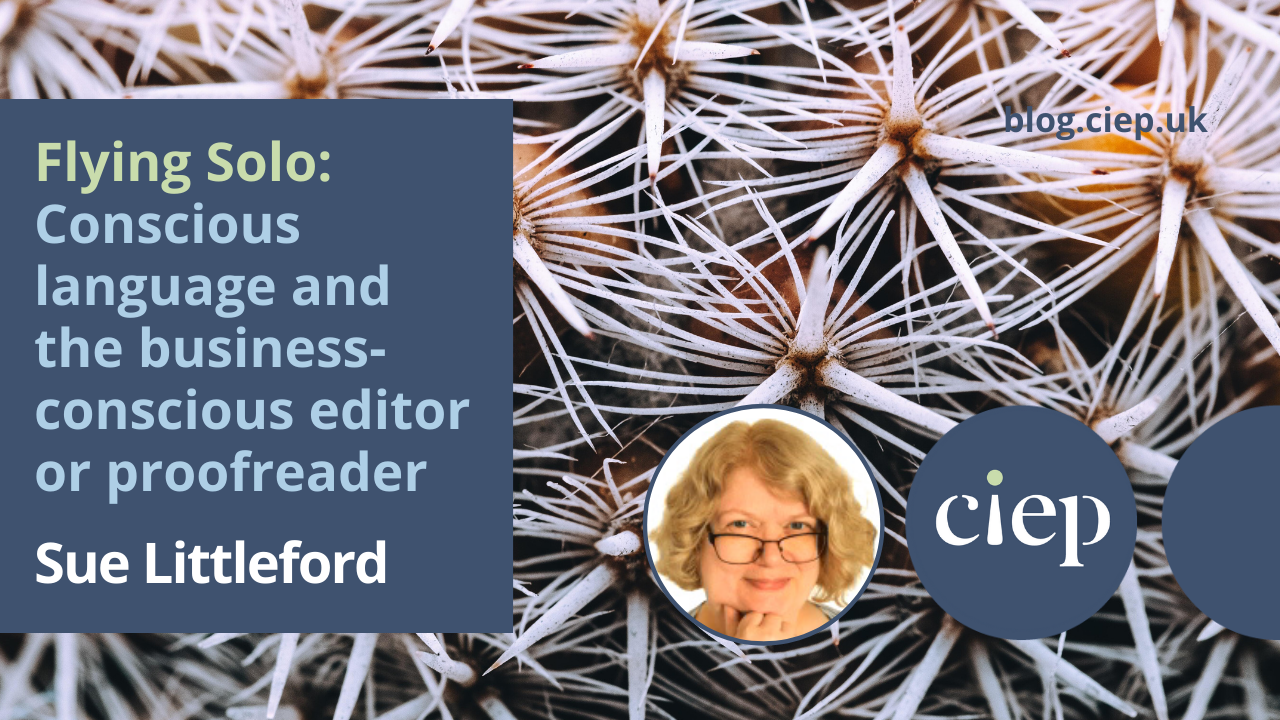In this latest Flying Solo post, Sue Littleford considers the importance of conscious language in marketing and selling your services as a freelance editor or proofreader.
Alienating possible clients is a business no-no. Sure, you don’t have to work with everyone who approaches you. There are folk who ask for a service you don’t provide, or are not happy to provide in the circumstances. Fine (as long as you’re not breaking anti-discrimination law).
Conscious language is a hot topic, rightly. We’re figuring out more and better ways to avoid making people feel prejudged, and to avoid raising barriers against their inclusion. As language professionals, we need to show we walk the walk.
There are two ways that conscious language and its close kin, discrimination, can affect our businesses – you choosing to reject a potentially rather profitable client because of your own beliefs about the world, based on first impressions; or potentially profitable clients rejecting you because of what you say in response to their query.
But aside from being bound by anti-discrimination legislation, it makes no business sense for us to discriminate, to any degree. You are, in effect, reducing your pool of potential clients, and the income you would earn from them, based on what’s going on in your own head, not what they are offering as work.
Incidentally: intent is irrelevant. If you hurt someone, it doesn’t matter whether you meant to or not. The pain is the same.
A word against generalising
Microaggressions accrete until they are a heavy burden that pierces your very being. You may not even notice handing out those tiny barbs, but you surely notice them when they’re directed at you, time after time after time.
Therefore: make it clear in your public writing – social media, blogs, website – that you encounter people as people, not as apparent members of a grouping about which you may have certain preconceived ideas. Those preconceptions may be rooted in a specific unpleasant experience, but when they become expanded from the particular to the general, that’s where microaggression rears its ugly head.
I’m a Manc. My ex-mother-in-law wasn’t my biggest fan. (OK, I admit, it was mutual.) When my then brother-in-law announced he was marrying a girl from Hull, my MIL exploded, ‘Not another bloody northerner!’
That’s an example of one particular beef being expanded to general prejudice. Hull is a good hundred miles from Manchester, yet my new sister-in-law was being branded the same as me, purely on the basis of the cities we were born in, decades earlier. Ridiculous, isn’t it?
Your communications
Many editors work with people for whom English is not their primary language, or it’s now their primary language, but they came to it later on in life, rather than being immersed in it from birth.
How do you refer to those authors in your marketing, when you say who you help? Are you assuming that all such authors have poor English, and will make the same kinds of errors? Do you even hint that’s what you have assumed, when you think you’re saying you’ll bend over backwards to help these poor folk who need all your skills to be able to string a sentence together? That’s a microaggression at the least.
Working in such a heavily online industry as ours, your opportunities to discriminate on grounds of looks alone are equally heavily limited. But what about people’s names? What assumptions do you make based on someone’s name about how much editing they might need, and how much it will cost? And what about the country extensions to the domain names of some email addresses? Do you have a knee-jerk reaction to those you find less desirable in a client? Are you already formulating your No, Thanks, email even as you open theirs?
It is very much good business sense, as well as kind, not to make assumptions based on a partial picture, but to gather evidence – get a sample of the writing, in very basic terms.
That old saying – you only get one chance to make a first impression – cuts both ways. Someone who emails you looking for editorial services may use an unusual (to you) form of greeting, or seem overly formal or overly casual. When you email someone back, indicating your assumptions ahead of the evidence about their writing, you are also making a first impression – and will probably be judged on it.
Be conscious of the lost opportunities that can result, and look closely and critically at your public communication: your website text, your social media, blog posts and profiles, and your responses to client approaches.
Encounter people on their own merits
I’ve already stressed apparent members of a particular group, because we all know what it’s like to be (mis)judged at first glance. I’d now add that membership of any particular group may well be temporary, and it is definitely partial.
Consider for a few moments all the groups that you yourself belong to: your nationality, your locality, your position in your family, your education, your career history, your personal appearance, your accent, your sexuality, your health status, your financial status, your outlook on life, your sleeping pattern, your taste in food and drink, your religion and how you practise it, your lack of religion and how you express it …
Every one of us is a temporary and partial member of a plethora of potential groupings. No one group completely describes us.
Who are we to judge a person’s worth – or value to us as a client – based on what we have just guessed about them, before they show us who they are?
What you perceive is not all there is.
What you show is not all you are.
The thing is, we all make judgements about people the moment we meet them, whether in person, on the phone, by email or on social media; it’s human nature – a visceral safety mechanism to sort strangers into friend or foe. But people in your inbox are at a safe distance, and you can afford to explore further. (OK, I’ll make an exception for scammers – always remain alert to those.)
Resolve to let people (scammers aside) show you who they are, before you make a decision about whether to work with them. This means opening up a dialogue with people enquiring about your services, rather than ‘sorry, too busy’ instant responses because you perceive, from their name or their email address, that they’re not for you.
We do have to protect ourselves from bad clients, of course we do. We want to work for reasonable people at a decent rate and be paid promptly. So by engaging more with potential clients, and getting them to show us who they are, we can have the double benefit of finding the diamond in the rough as well as discovering those folks who arrive fully clothed in red flags and should indeed be avoided. Making judgements prematurely means that you can lose out both ways.
Educate yourself
There are some excellent resources around to improve this part of your skills. My go-to is the marvellous Crystal Shelley, whom many of us have encountered. Her Conscious Language Toolkit for Editors is such a help when you’re stuck for an alternative word or phrase, and has many links to further resources. Just reading through the list of terms that need alternatives should set you thinking hard.
In February 2022, EFA launched a course on the same subject, written by Shelley, for which CIEP members get a discount. Shelley blogged about the launch.
There’s also Gregory Younging’s book Elements of Indigenous Style: A Guide for Writing By and About Indigenous Peoples (ISBN 978-1-55059-716-5).
There’s the free conscious language style sheet for PerfectIt created by Sofia Matias. That really helps you pick up things you may miss as you edit – or write.
Not least, there’s the website Conscious Style Guide, which we should all bookmark.
Pop your own recommended resources in the comments!
Your editing/proofreading
Now you’re being more conscious about your language when you write for your clients, or to your clients, you’re in a better position to help the clients you’re working with. This is also excellent business sense – clients are more likely to recommend you to others if you’ve helped them avoid conscious-language missteps.
Support your clients to use more neutral terms; use descriptions that the groups use for themselves – but good luck finding high degrees of agreement on what those descriptions are: groups are collections of individuals who have in common one element of their being, they’re not homogeneous monoliths! And people aren’t fungible.
So you’ll need to do your research and use your editorial judgement when editing or suggesting changes – such as whether person-first or condition-first is most appropriate when talking about people’s health. Hint: it’s not always person-first.
Get really practised and expert at this, and you can market a new service or make it a feature of your current offer – more good business sense.
As I write this, I have a chapter in mid-copyedit – it uses ‘manpower’ persistently. Those are changing to ‘staff’ or ‘personnel’ or ‘workforce’ as fast as I encounter them.
In sum
It’s sound business sense to educate yourself about conscious language; to encounter people on their own merits, without making assumptions; to make it clear in all your public-facing communications that you do that; and to help clients to avoid micro (and not-so-micro) aggressions in their writing.
About Sue Littleford
 Sue Littleford is the author of the CIEP guide Going Solo, now in its second edition. She went solo with her own freelance copyediting business, Apt Words, in March 2007 and specialises in scholarly humanities and social sciences.
Sue Littleford is the author of the CIEP guide Going Solo, now in its second edition. She went solo with her own freelance copyediting business, Apt Words, in March 2007 and specialises in scholarly humanities and social sciences.
 About the CIEP
About the CIEP
The Chartered Institute of Editing and Proofreading (CIEP) is a non-profit body promoting excellence in English language editing. We set and demonstrate editorial standards, and we are a community, training hub and support network for editorial professionals – the people who work to make text accurate, clear and fit for purpose.
Find out more about:
Photo credits: cactus by Ryan Schram, counters by Markus Spiske, both on Unsplash, welcome note by cottonbro on Pexels.
Posted by Harriet Power, CIEP information commissioning editor.
The views expressed here do not necessarily reflect those of the CIEP.




I’m going to save this on my desktop.
Thanks Sue.
Wow – that’s a huge compliment! Thanks, Melanie.